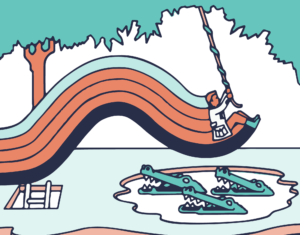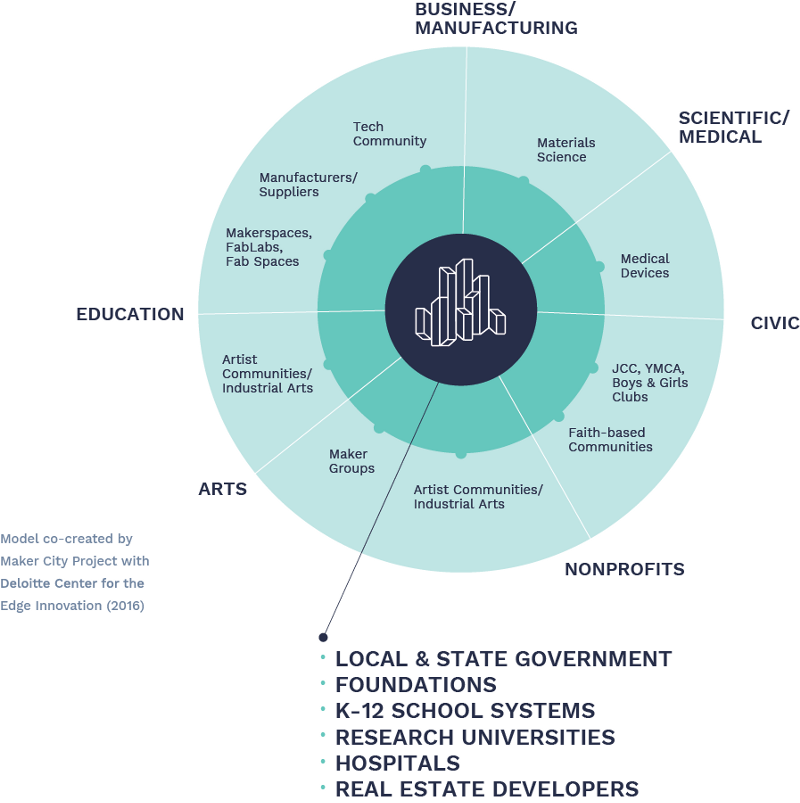
Step 1. Understand where you are at in terms of ecosystem development
It may seem strange, but your first stop in pulling together a Town Hall is not the Mayor’s Office.
Instead, you are going to want to get started by making a list of people who are involved in the Maker movement in your city and town.
Develop a short list of the people you’d like to invite to be on your team to plan and execute the Town Hall (“Planning Committee”).
- A local Makerspace, if you have one – example: Vocademy, Riverside (CA)
- Maker event organizers – this could be a Maker Faire, a robotics regional, or a Maker inspired craft faire.
- Colleges and Universities – this could be professors, researchers, staff, clubs, or university Makerspaces.
- A teacher, librarian, or educational advocate who understands the transformational impact the Maker movement can have on a community – example: Remake Learning Council, Pittsburgh (PA)
- A church or community leader – example: Mt. Elliott Makerspace, Detroit (MA)
- A young person who is committed and excited about Making – example: Ethan Toth, Wenatchee (WA)
- A workforce development organization – example: Per Scholas which operates in multiple communities including New York and Atlanta
- A microfactory or innovation center – example: First Build, Louisville (KY)
- The person or persons responsible for organizing a local hardware meetup – example: Nick Pinkston of Plethora, San Francisco (CA)
- A civic innovator – this could be the Chief Innovation Officer for your city or town (if there is one) or someone else in formal or informal leadership capacity, say the person who runs the local coworking space or innovation center.
- A real estate developer involved in reclaiming old factory or mill space and making it available to entrepreneurs and makers – example: – the Gate 510, San Leandro (CA)
- A general manager or founder of a local company that manufactures products in your city or town – example: Shinola, Detroit (MI)
- Museums – example: New York Hall of Science, Queens (NY)
(These are the same categories we uncovered in the book Maker City: A practical guide to reinventing your city. If you need help identifying people in your community who might be active in the Maker movement, feel free to look to the book for additional ideas.)
If you don’t have much traction with Making in your particular community, a good place to start to recruit people on to the Planning Committee may be by looking outside your immediate city or town to find resources that are operating within your region. You might look to a community college that operates at the county level – for example – especially if there is a visionary on staff, someone specializing in engineering, computer science, or another STEM field.
What you’ll be asking each person/organization to do
- Meet 1-4 times with yourself and other members of the Planning Committee
- Promote and invite their stakeholders and constituents to attend the Town Hall
- Assist with setup, tear down, and other logistics the day of the Town Hall itself
- Provide topics and be prepared to speak to that topic the day of the Town Hall
- Follow up on next steps coming out of the Town Hall
- Encourage merchants and/or major employers in your city or town to donate space, food, and beverages to support your Town Hall (optional – you can also chose to sell food and beverages to your attendees to recover your costs)
First Things First
One of the very first issues you’ll want the Planning Committee to consider is how well developed the ecosystem in your city or town is around Making. To figure this out, we suggest you use Chapter 3 of the book Maker City: A practical guide to reinventing your city as a guide.
The development of your ecosystem around Making has practical implications for how you will structure your Town Hall.
TYPES OF TOWN HALLS
Simple. If your ecosystem is very undeveloped, consider structuring your Town Hall as a 2 hour meeting. This type of Town Hall is simpler and less-expensive to pull off as often no food and minimal beverages are required. A Town Hall first thing in the morning over breakfast might be optimal for this purpose.
More Elaborate. If your ecosystem is more developed, consider a 4-6 hour meeting to be held as an “Unconference” (see Step 2 for details). A Town Hall on a Saturday might be ideal for this purpose.
To support an unconference you need the following:
- A slightly bigger venue, ideally one with several rooms for breakout sessions. Note that we have seen Unconferences happen inside one large-ish room, with breakout sessions happening in the 4 corners of the room. This can be a little chaotic but also fun.
- More presenters than you think you can accommodate in the time allotted; participants at the Town Hall will be voting sessions up or down, thus shaping the agenda in real time.
- More elaborate food and drink compared with a 2-hour meeting. Consider providing a box lunch for a modest fee the day of the event.
Pitfall to Avoid
 Don’t let the format you choose for your Town Hall get in the way of your goals!
Don’t let the format you choose for your Town Hall get in the way of your goals!
The reason you are organizing a Town Hall is likely to be one or more of the following:
- To share information across the Maker ecosystem in your community
- To build on each other ideas which means listening to each not just talking at each other
- To identify areas where more help is needed to strengthen the ecosystem
- To start a dialogue about how the Maker community can be leveraged to solve real community problems
Don’t shy away from topics that seem emotionally loaded and/or controversial. We’ve seen great Town Halls discuss how the Maker movement engages those who feel left behind and creates a feeling of hope where there was none. Hopelessness can manifest itself in many ways, including opioid abuse and anger. In short, don’t be afraid if your Town Hall engenders strong emotions. It’s all part of the process of bringing your community together to create a hopeful future.

